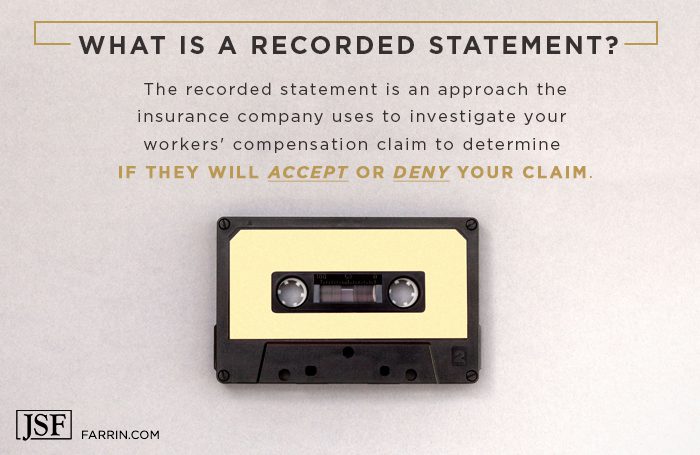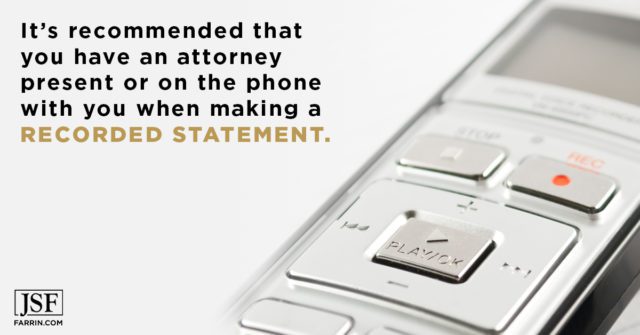After an injured worker reports or files a claim for a work injury, the employer has to promptly investigate and respond to the claim “at the earliest practicable time…”
As part of that prompt response, the law allows the employer or insurance company to request a statement directly from the employee about the facts surrounding how the work injury occurred. This is called a recorded statement.
Sometimes the recorded statement is a straightforward process where an injured worker is allowed to simply recount how they were injured. Other times I have seen some insurance adjusters use the recorded statement as a way to lead an injured worker to say something that may be damaging to their case so the insurance company can deny their claim.
3 Ways Recorded Statements Can Trap You
-
- The state of North Carolina requires employers to pay only for injuries that occur as a result of an accident or occupational disease. An accident can be a slip, trip, or fall and it can also be an untoward, unusual, or unexpected event. Based on my experience, employees typically do not want to damage their relationship with their employer even after they have suffered injuries. Yet some adjusters will throw phrases at them like “normal job duties” or “doing your job in your regular way” as a way of trying to prevent the employee from explaining what actually happened to cause their injury. When employees hear these types of phrases, some may feel that it is pointing toward faulting the employer. Typically the clients I have dealt with do not want to cast blame on their employer for their injury nor do they want to get the employer in trouble even if the employer was to blame. These clients typically want to assure their employer and the employer’s insurance company that no one was at fault. Yet I’ve seen some insurance adjusters take advantage of this mindset to lead these employees to state that there was nothing unusual that occurred when they were injured. They may ask leading questions to the employee so they provide an account of events which may not be entirely accurate. Sometimes they won’t allow the employee to provide an open-ended account of events – as this often leads to acceptance of needed medical and disability benefits. Instead, they may be more likely to ask specific questions that might potentially lead to denied benefits.
-
- Another tactic I have seen some insurance adjusters use, is to try to limit the nature of the injury that occurred. Workers’ compensation is designed to cover any injury that occurs as a result of an accident. If someone is involved in a highly traumatic event, they may have injuries to multiple body parts. I have seen some adjusters ask leading questions to try to limit what an employee can later claim as being injured in the accident. Again, it is a process of putting words into the claimant’s mouth. An adjuster I deal with quite often frequently asks questions like, “So you only injured your knee?” When in fact, more than the knee was injured. Again, this puts the employee in a difficult spot. They do not want to claim conditions that are unrelated to the accident. They only want what is fair and necessary to heal and return to work. This leaves some injured employees minimizing their symptoms in order to “go along” with the process.
-
- Some insurance companies we have dealt with have also occasionally used the recorded statement to attack the injured employee by asking irrelevant and offensive questions. This might include asking employees about other health conditions which are unrelated to the injury, personal information which may be uncomfortable for an employee to provide, and prior health information which an employee wishes to keep private. It puts the injured worker, who is simply trying to get treatment for their work injury, in an uncomfortable position.
They may not want to share past details of their life – nor are they legally obligated to in a recorded statement. Some have confided to us that they are worried the employer will find out about their private health conditions. Those details have no bearing on what occurred at work. It’s a Catch 22. If the injured worker declines to answer these unfair and invasive questions, some insurance companies may use that as a basis to deny needed benefits. If they do answer them, the insurance company may find reasons to deny the claim.
Benefits of a Workers’ Comp Lawyer in Recorded Statements
Answering recorded statements can be tricky for some injured workers to answer. If they are not answered in the precise manner that is clear to the adjuster that workers’ comp benefits should be covered, the statement can result in unfounded denial of benefits.
I take these statements very seriously for my clients.
I will only allow my clients to give a recorded statement with my guidance. And I do not allow an insurance adjuster to ask unfair, leading, or inappropriate questions.
I have had many, many clients come to me with denied claims simply because they did not seek the assistance of an attorney before giving their recorded statement. These statements can be a mine field for claimants. They are frequently used in evidence by employers and insurance companies in court to support a denial of a claim. It is only by adequate and thorough preparation that a claimant is in the best position to give a statement. It is also with the guidance of experienced legal counsel that they can try to avoid providing an incorrect account of events.
As stated earlier, I always advise my clients not to give any statement whatsoever to the insurance company before consulting with me and without me present. There are so many ways we’ve seen injured employees hurt their workers’ comp claim by talking to an insurance adjuster, without realizing how some of their statements may be misinterpreted in the best interest of the insurer.
I, or any of our workers’ compensation attorneys, can help you prepare to speak truthfully about your claim, and in ways that do not harm your case. We will be on the call with you to make sure the adjuster does not take advantage of you or twist your words. If a written statement about the events of your injury is the best option, we will coordinate with you to prepare a truthful statement to help protect your right to benefits.
Get a FREE Case Evaluation From NC Workers’ Comp Lawyers
If you are faced with giving a recorded statement to a workers’ comp insurance adjuster, contact an experienced North Carolina workers’ comp lawyer at the Law Offices of James Scott Farrin before saying anything. You don’t want to inadvertently damage your case before getting a professional evaluation.
Contact us or call 1-866-900-7078 for a free case evaluation.
You May Also Be Interested In
Tips on How to Handle a Recorded Statement for Your Workers’ Comp Claim
Should I Talk to the Insurance Company After a Work Injury?
What’s Wrong With Providing a Recorded Statement to My Workers’ Comp Adjuster?





